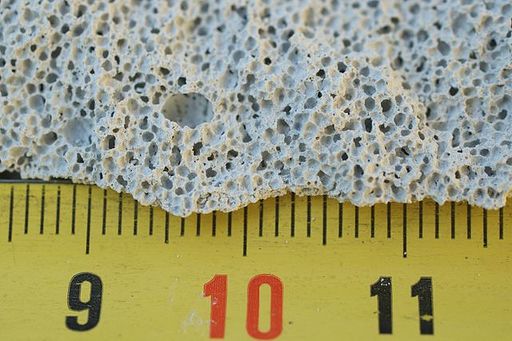Aerated Concrete: Difference between revisions
(+image; +categories) |
(Cleaned Page Up a Bit (To better format standards etc)) |
||
| Line 1: | Line 1: | ||
[[File:640px-Aerated autoclaved concrete - detail.jpg|thumb|right|512px|Aerated autoclaved concrete - close-up view]] | |||
[[ | =Basics= | ||
*Concrete (Usually with fine aggregate) mixed with a Foaming Agent | |||
*Thus Has Low Density and High Workability (Some can even be cut with hand tools) | |||
*Some Special Formulations [[Autoclaved Aerated Concrete]] Can Be Put in Forms And Autoclaved for High Strength | |||
=Bit from [[User ]] | |||
Descriptions I found comparing concrete to [[Autoclaved Aerated Concrete]] ([[AAC]]) is [Here: http://www.understanding-cement.com/autoclaved-aerated-concrete.html] | |||
Seems like it would not be a problem to produce it from lime. This particular article above talks about large scale production, but this tech has been around for over 100 year now and I'm pretty sure that is not how it started / there are options for smaller production lines. [This http://www.aircrete-europe.com/en/aircrete-aac/history-aac.html] company has a brief history of AAC: | |||
I think that, if you can find a solution for producing it or negotiating a deal with the few people that produce it in US, it can potentially cut costs, especially in labor. I mainly did research on it because I am interested in it for the building of a music studio...and this material also offers good insulation both sound and thermal. | |||
I'm looking forward to reading... | |||
I think that, if you can find a solution for producing it or negotiating a deal with the few people that produce it in US, it can potentially cut costs, especially in labor | |||
I'm looking forward to reading | |||
[[Category:Housing and construction]] | [[Category:Housing and construction]] | ||
[[Category:Materials]] | [[Category:Materials]] | ||
Revision as of 02:06, 21 May 2019
Basics
- Concrete (Usually with fine aggregate) mixed with a Foaming Agent
- Thus Has Low Density and High Workability (Some can even be cut with hand tools)
- Some Special Formulations Autoclaved Aerated Concrete Can Be Put in Forms And Autoclaved for High Strength
=Bit from User Descriptions I found comparing concrete to Autoclaved Aerated Concrete (AAC) is [Here: http://www.understanding-cement.com/autoclaved-aerated-concrete.html] Seems like it would not be a problem to produce it from lime. This particular article above talks about large scale production, but this tech has been around for over 100 year now and I'm pretty sure that is not how it started / there are options for smaller production lines. [This http://www.aircrete-europe.com/en/aircrete-aac/history-aac.html] company has a brief history of AAC:
I think that, if you can find a solution for producing it or negotiating a deal with the few people that produce it in US, it can potentially cut costs, especially in labor. I mainly did research on it because I am interested in it for the building of a music studio...and this material also offers good insulation both sound and thermal. I'm looking forward to reading...
